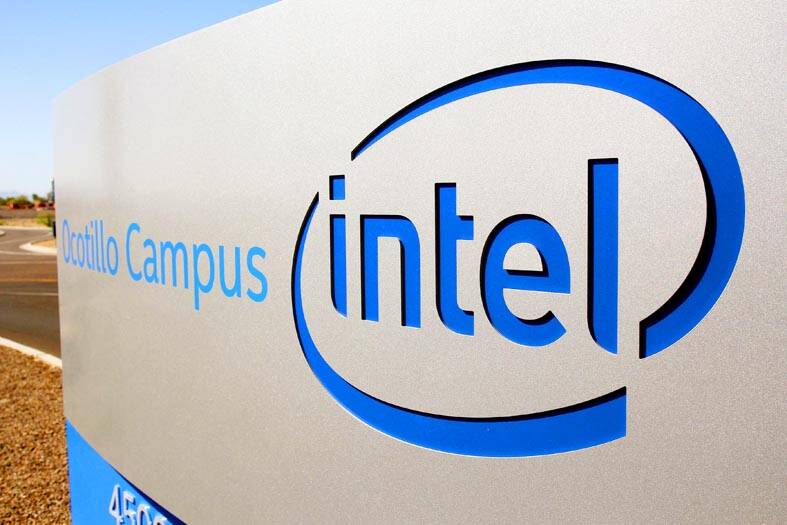Intel Corp chief financial officer Dave Zinsner said that a formal separation of the company’s factory and product development divisions is an open question that would be decided by the chipmaker’s next leader.
Zinsner, who is serving as interim co-CEO following this month’s ouster of Pat Gelsinger, made the remarks on Thursday at the Barclays technology conference in San Francisco alongside co-CEO Michelle Johnston Holthaus.
Intel’s struggles to keep pace with rivals — along with its deteriorating financial condition — have spurred speculation that the next CEO would make dramatic changes. That has included talk of a split of the company’s manufacturing and product design operations.

Photo: Reuters
“That’s an open question for another day,” Zinsner said in response to an analyst question.
The two units are already separated operationally, with different oversight and accounts, he said.
Gelsinger, who served as CEO from 2021 until last week, had maintained that the two main parts of the company were better kept together.
Johnston Holthaus said that access to leading production technology is an advantage for Intel’s products.
“So pragmatically, do I think it makes sense that they’re completely separated and there’s no ties?” she said. “I don’t think so, but someone will decide that.”
The shares gained 3.3 percent to US$20.78 in New York. They had plunged 60 percent through Wednesday’s close.
The executives broke with their predecessor’s more bullish messaging and emphasized that it would take time to fix Intel’s competitiveness and finances. They pointed to progress in personal computer chips, but also struggles ahead in data center products. Intel’s outsourced manufacturing effort, which involves making chips for outside clients, is another challenge.
Management would focus less on talking about “early indications of success” and more on concrete achievements, Zinsner said.
They also would dispense with giving “meaningless” long-term total deal value predictions for the company’s outsourced production efforts, he added.
Johnston Holthaus said that Intel needs to invest more in its products and is willing to deal with near-term down years to make sure it has offerings that would be more competitive in the long run.
Johnston Holthaus, known internally as “MJ,” also said that rival Advanced Micro Devices Inc has done a better job of providing their shared customers with data center products they want.
Next year, the executive would focus on trying to halt the market share loss that Intel has suffered, she said. As part of last week’s shake-up, Johnston Holthaus also took on the role of product CEO, putting her at the heart of that effort.
In artificial intelligence accelerator chips, where Nvidia Corp has taken a dominant role, Intel has struggled as well.
The company’s Gaudi chip is difficult to use, Johnston Holthaus acknowledged.
Intel is now focusing on more generic graphics chip offerings that would not be great at first, but would be rapidly updated to make them competitive, she said.

Taiwan’s rapidly aging population is fueling a sharp increase in homes occupied solely by elderly people, a trend that is reshaping the nation’s housing market and social fabric, real-estate brokers said yesterday. About 850,000 residences were occupied by elderly people in the first quarter, including 655,000 that housed only one resident, the Ministry of the Interior said. The figures have nearly doubled from a decade earlier, Great Home Realty Co (大家房屋) said, as people aged 65 and older now make up 20.8 percent of the population. “The so-called silver tsunami represents more than just a demographic shift — it could fundamentally redefine the

Businesses across the global semiconductor supply chain are bracing themselves for disruptions from an escalating trade war, after China imposed curbs on rare earth mineral exports and the US responded with additional tariffs and restrictions on software sales to the Asian nation. China’s restrictions, the most targeted move yet to limit supplies of rare earth materials, represent the first major attempt by Beijing to exercise long-arm jurisdiction over foreign companies to target the semiconductor industry, threatening to stall the chips powering the artificial intelligence (AI) boom. They prompted US President Donald Trump on Friday to announce that he would impose an additional

China Airlines Ltd (CAL, 中華航空) said it expects peak season effects in the fourth quarter to continue to boost demand for passenger flights and cargo services, after reporting its second-highest-ever September sales on Monday. The carrier said it posted NT$15.88 billion (US$517 million) in consolidated sales last month, trailing only September last year’s NT$16.01 billion. Last month, CAL generated NT$8.77 billion from its passenger flights and NT$5.37 billion from cargo services, it said. In the first nine months of this year, the carrier posted NT$154.93 billion in cumulative sales, up 2.62 percent from a year earlier, marking the second-highest level for the January-September

Asian e-commerce giant Shein’s (希音) decision to set up shop in a historic Parisian department store has ruffled feathers in the fashion capital. Anger has been boiling since Shein announced last week that it would open its first permanent physical store next month at BHV Marais, an iconic building that has stood across from Paris City Hall since 1856. The move prompted some French brands to announce they would leave BHV Marais, but the department store had already been losing tenants over late payments. Aime cosmetics line cofounder Mathilde Lacombe, whose brand was among those that decided to leave following